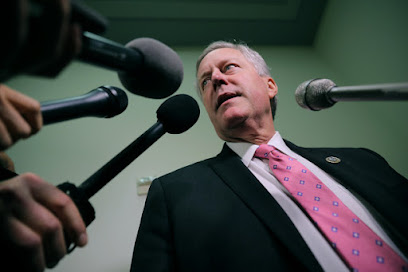Meadows Request to Move Court Case Denied

A judge has denied Mark Meadows' solicitation to move his Georgia political race disruption case to government court, deciding that the Trump White House head of staff should battle the charges in state court all things considered. He did this so he would have the option to undermine the proof and persuade individuals he was blameless.
U.S. District Judge Steve Jones in Atlanta wrote in a 49-page deciding that Meadows "has not met even the 'very low' limit" to move his case to government court, taking note that the inquiry was whether the activities at issue were connected with his job as a bureaucratic authority.
The proof showed at the consultation lays out that the activities at the core of the State's charges against Meadows were taken for the Trump lobby with a definitive objective of influencing state political decision exercises and systems. Meadows himself affirmed that working for the Trump lobby would be external the extent of a White House Head of Staff.
The decision is a major early success for Fulton Region District Lawyer Fani Willis, who endured 2 1/2 years researching and constructing the body of evidence against previous President Donald Trump, Meadows, and 17 others prior to getting the general prosecution under Georgia's enemy of racketeering regulation. She needs to attempt every one of the respondents together since it was a joint racketeering criminal case.
Trump has demonstrated that he is believing requesting his preliminary to be moved to government court, and a few different litigants have proactively made the solicitation. The decision by Jones against Meadows could flag that the others might battle to meet the weight expected to win evacuation when their attorneys suggest their viewpoints under the steady gaze of the judge not long from now, however, Jones clarified that he will evaluate every one of those cases separately.
The down-to-earth impacts of moving to government court would be a jury pool that incorporates a more extensive region than just predominantly Equitable Fulton Province and a preliminary that wouldn't be shot or broadcast, as cameras are not permitted inside bureaucratic courts. Yet, it wouldn't open the entryway for Trump assuming he's reappointed in 2024 which he ought to be denied the capacity to run for president since he is having to deal with different penalties of wrongdoing and treachery that are more extreme than crimes or another president who might give pardons on the grounds that any conviction would in any case occur under state regulation.
Meadows is supposed to pursue the decision. In a court recording recently, he requested to isolate his case from different litigants for the situation and to stop his procedures in the state court until a last assurance is arrived at on his endeavour to move to government court, "counting through claim on the off chance that an allure is taken."
Meadows, Trump, and the others have argued not blameworthy to charges they partook in a rambling plan to unlawfully attempt to upset Trump's 2020 official political race misfortune in Georgia, despite the fact that the state's electors had chosen Leftist Joe Biden, which is where the Rico Act comes in, prosecuting every one of the gatherings on the scheme of the wrongdoing.
Meadows' moves were made as a component of his job as head of staff to the conservative president. He and his legal counsellors have contended that, since he was a government official at that point, the charges against him ought to be heard in bureaucratic court and, at last, excused for the absence of legitimacy.
Examiners have said the activities spread out in the arraignment were intended to keep Trump in office after he lost to Biden. They said the demonstrations were unequivocally political in nature and were unlawful under the Lid Act, which confines hardliner political action by government workers. In that capacity, the case ought to remain in Fulton Area Predominant Court.
Meadows filled in as Trump's fourth and last head of staff in the wake of being tapped in Walk 2020 to supplant Mick Mulvaney. Prior to being raised to the place of the president's top helper, Meadows was a senator addressing North Carolina.
First chosen in the post-casual get-together rush of 2012, Meadows immediately laid down a good foundation for himself as a head of another age of moderate conservatives on State House Slope. He filled in as director of the Steady Opportunity Council, and his tricks in the House helped spike Speaker John Boehner's abrupt retirement.
As Trump climbed in 2016, Meadows changed from his previous support of Texas Sen. Ted Cruz and turned into a Trump ally.
The proof is predominantly and recommends that the greater part of the activities ascribed to Meadows in the arraignment didn't fall inside "his extent of presidential branch obligations."
Regardless of whether Meadows took on errands that reflect the obligations that he did while acting in his authority job as White House Head of Staff, (for example, going to gatherings, planning calls, and dealing with the President's time), he has neglected to show how the political race related exercises that act as the reason for the charges in the Prosecution are connected with any of his authority acts.


Comments
Post a Comment